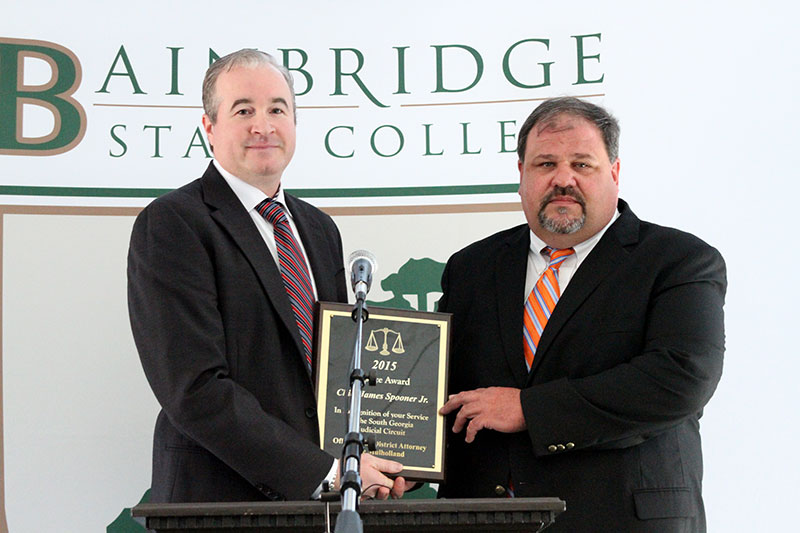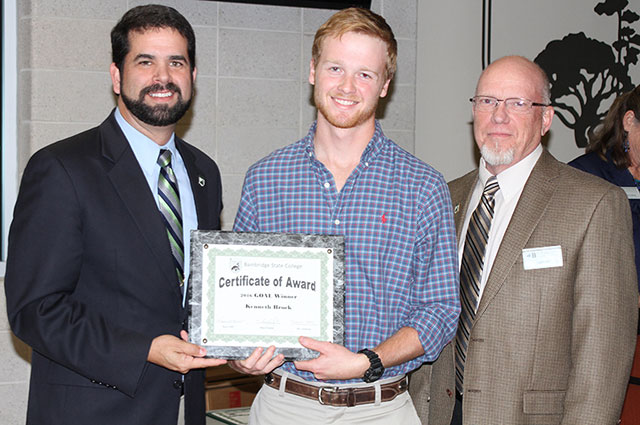
In a press release Friday, the Chancellor of the Board of Regents for the State of Georgia announced the recommendation to consolidate Bainbridge State College and Abraham Baldwin Agricultural College. Although an official vote will not take place until next week, leaders are making preparations in the event of a merger.
In an email from Bainbridge State College Media Coordinator Susanne Reynolds:
“Today, the University System of Georgia announced that the Board of Regents will act on a recommendation to consolidate Abraham Baldwin Agricultural College and Bainbridge State College at its meeting on Wednesday, January 11, 2017.
While the proposed consolidation will present challenges, ABAC President David Bridges and Bainbridge State Interim President Stuart Rayfield pledge to work together to enhance educational opportunities for students.
Presidents Bridges and Rayfield will reserve comment until the Board of Regents takes final action next Wednesday.”
PRESS RELEASE
Chancellor Recommends Institution Consolidations
Georgia Southern and Armstrong State, ABAC and Bainbridge State
Atlanta — January 6, 2017
University System of Georgia Chancellor Steve Wrigley plans to recommend two consolidations to the Board of Regents: Georgia Southern University and Armstrong State University and Abraham Baldwin Agricultural College (ABAC) and Bainbridge State College. The Board will act upon the recommendations at its Jan. 11 meeting. If approved, the two new institutions will be named Georgia Southern University, to be led by President Jaimie Hebert, and Abraham Baldwin Agricultural College, to be led by President David Bridges.
The consolidation of these four institutions is expected to enable the University System to better serve students, broaden or redesign academic programs offered in the coastal and south Georgia regions and reinvest savings into academics to improve student success.
“Creating the new Georgia Southern University will combine the best of both institutions, which are just an hour apart and ultimately serving many of the same students,” said Wrigley. “Consolidating Armstrong and Georgia Southern will create one institution with expanded regional presence, tailored degree programs for the coastal region and positioned to significantly enhance the University System’s economic impact for the area.”
Georgia Southern is already the number-one transfer choice for Armstrong students, and both institutions are among the top destinations for students seeking public higher education from Bryan, Chatham, Effingham and Liberty counties.
Initial opportunities from consolidating Georgia Southern and Armstrong include:
• Creates an institution of more than 27,000 students, making it the fourth largest public university in Georgia.
• Creates a more comprehensive university that serves the needs of the region with a range of degree programs for high demand careers, such as engineering and health care.
• Expands upon Armstrong’s expertise as the University System’s largest producer of undergraduate health professionals.
• Creates opportunities for raising graduation rates for students with Georgia Southern’s best practices.
• Builds on Armstrong’s nationally recognized leadership in supporting student veterans and active-duty military, which will enable the new institution to reach a much larger student population.
• Reinvests savings from administrative efficiencies into programs to support student success.
• Ensures the new Georgia Southern University’s Savannah campus offerings effectively balance with and complement those provided by Savannah State University.
In south Georgia, the recommended consolidation proposes to expand upon ABAC’s specialized-degree programs that are uniquely meeting the needs of agriculture, the largest industry in Georgia.
“Consolidating ABAC and Bainbridge creates a unique opportunity to strategically align Bainbridge State’s degree offerings with workforce and regional needs,” said Wrigley.
In addition, ABAC has become a leader in new student recruitment, enrollment management and academic achievement and will bring these best practices to Bainbridge State, which has been facing enrollment declines over the last five years.
“We are committed to serving south Georgia in public higher education and our partnership with the Tifton and Bainbridge communities,” said Wrigley. “This consolidation is a long-term investment of the University System in south Georgia.”
Initial opportunities from consolidating ABAC and Bainbridge State include:
• Expands upon ABAC’s specialized-degree programs that have successfully identified and partnered with the needs of agriculture.
• Strategically aligns degree offerings with workforce and regional needs with a focus on agriculture utilizing a select range of degrees currently offered at ABAC.
• Establishes a simpler path for associate-degree students to achieve bachelor’s degrees.
• Applies ABAC’s best practices in new student recruitment, enrollment management and academic achievement.
• Maintains access for students in Bainbridge to the Technical College System of Georgia certificate/diploma programs.
• Continues to serve local high school students in the Bainbridge area through the highly successful Move On When Ready dual-enrollment program.
• Reinvests savings from administrative efficiencies into programs to support student success.
The recommendation to consolidate the four institutions follows the six guiding principles for consolidation approved by the Board in Nov. 2011: http://www.usg.edu/news/release/regents_approve_principles_for_consolidation_of_institutions.
If the Board approves the recommendation, implementation teams with representatives from the campuses will soon be formed for the two consolidations. The two, separate implementation teams will be charged with the responsibility to work out the many details associated with each consolidation.
The University System and the four institutions will hold campus and community listening sessions in the coming months to seek and hear input on ways to best design the new institutions to serve their respective regions and the state.




Be the first to comment